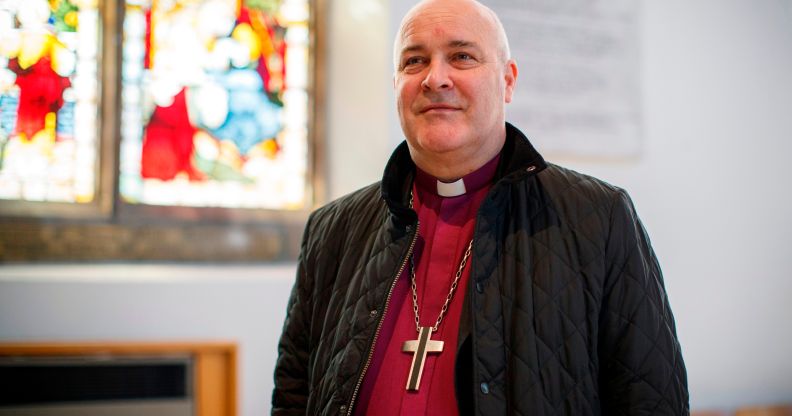New Archbishop of York: Church of England should welcome everyone ‘regardless of their sexuality’

Stephen Cottrell will take over as Archbishop of York, and said there is “no place for homophobia” in the Church of England. (TOLGA AKMEN/AFP via Getty)
The new Archbishop of York, the second most senior position in the Church of England, is set to take over next year and he has admitted that the church’s record on diversity ‘isn’t good’.
Stephen Cottrell, currently the Bishop of Chelmsford, will succeed John Sentamu as the Archbishop of York in June 2020.
In 2014, the first gay clergy to marry in the UK had his permission to operate revoked by Sentamu.
According to News & Star, Cottrell said at a press conference on Tuesday (December 17) that the Church of England must “take responsibility” for a lack of BAME clergy and said that it must welcome “absolutely everyone, regardless of their sexuality”.
He said there was “no place for homophobia in the church”, and added: “When I do hang up my mitre I hope the church will look different, it will look more diverse but our record isn’t good and, dare I say it, we bishops must take responsibility.”
The Anglican church is currently being investigated by the Independent Inquiry into Child Sexual Abuse over historic child abuse allegations.
Cottrell acknowledged this, and said: “Particularly it’s about listening to survivors and making sure their voices are heard but I hope in the work I will do as Archbishop of York with the Archbishop of Canterbury, making the church safe for everyone will be a really top priority.”
Watch Bishop @CottrellStephen speak about his appointment as the next Archbishop of York #ABY98: https://t.co/1jthPxSgWi pic.twitter.com/jgGNV9Vple
— The Church of England (@churchofengland) December 17, 2019
The Church of England has been split in recent years over inclusion of LGBT+ people and recognition of same-sex marriages.
Cottrell previously said that, as the church continues to be divided on the issue of equal marriage, it should at least introduce formal ceremonies for same-sex couples.
He said: “Let me plain: LGBTI+ people are welcome in the churches of the Chelmsford diocese. They are welcome and we want to listen to them and work with them so as to find appropriate ways of expressing their love – for it is not good for human beings to be alone – in permanent, faithful, stable relationships.
“At the moment there is no consensus in the Church of England for those relationships to be formally blessed in Church, or for the Church of England to embrace same-sex marriage, but the current arrangements do welcome lay people and clergy into civil partnerships and there is no reason why prayers of thanksgiving for these relationships – perhaps a Eucharist – cannot be offered.”
He continued: “We need to find ways of living with this diversity, not being torn apart by it. This will, I know, be hard for some people to hear. Some think even this a step too far; and others think it nowhere near far enough.
“But I hope and pray that even these small steps will make a difference, for the pastoral and missiological implications of this issue, especially with young people, mean that we must do something, and that we cannot simply wait till there is complete ecumenical and Anglican Communion agreement before doing anything.”

